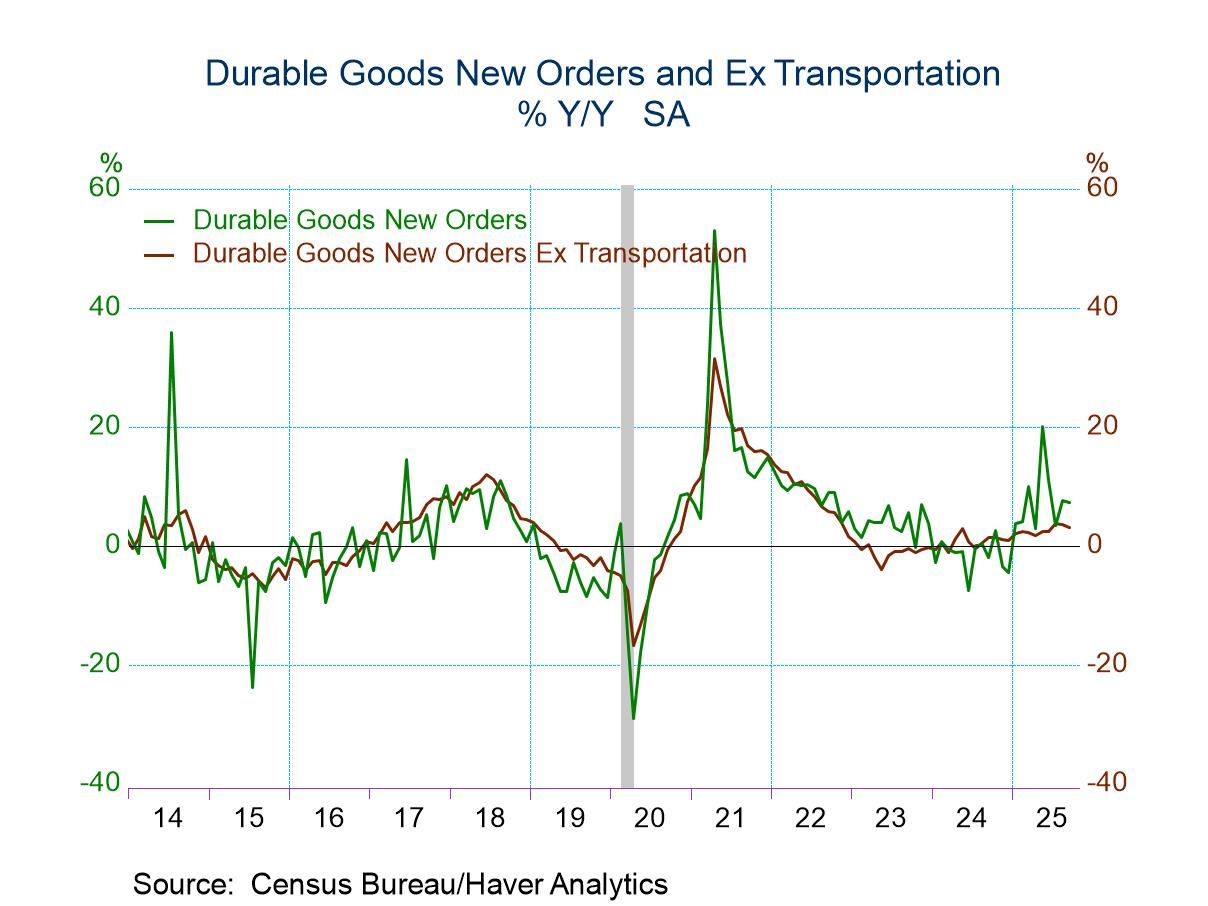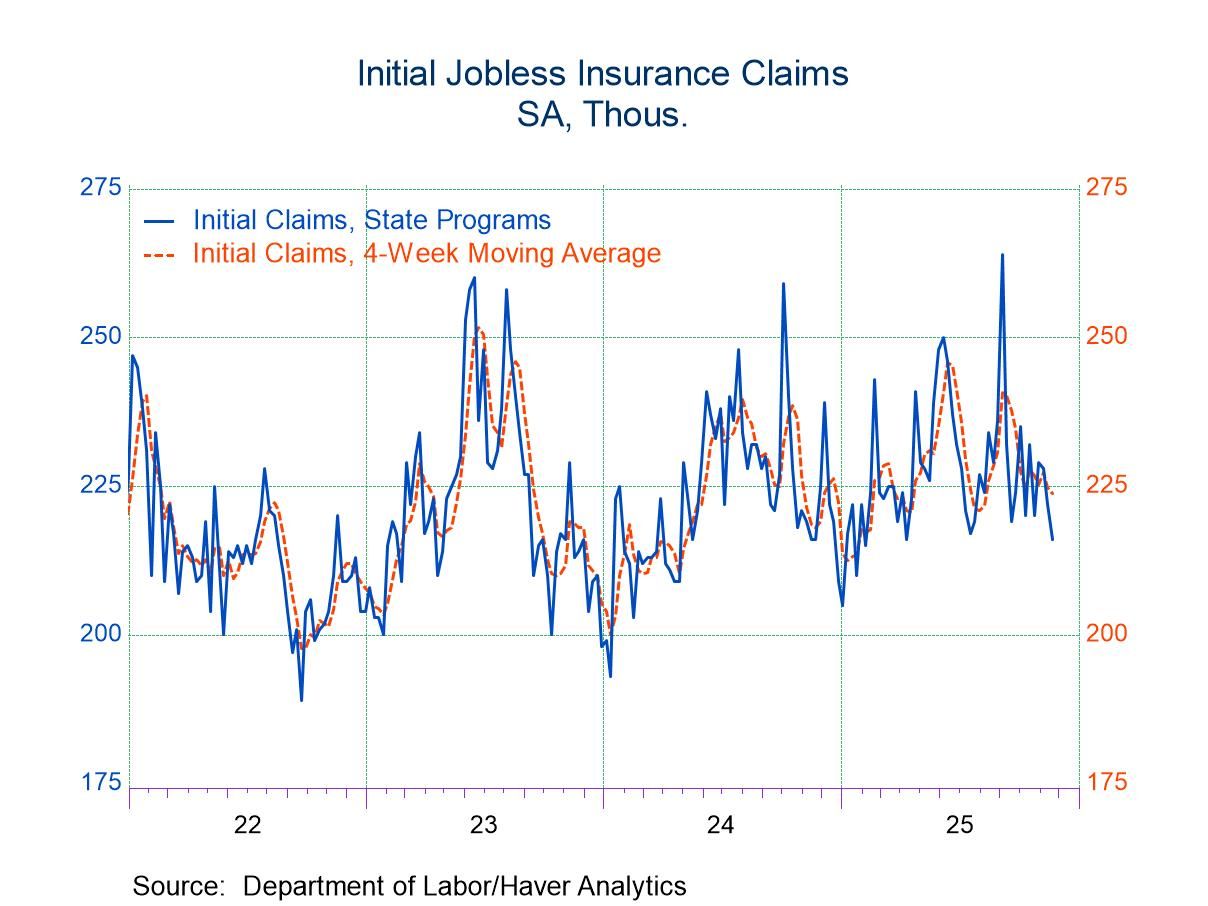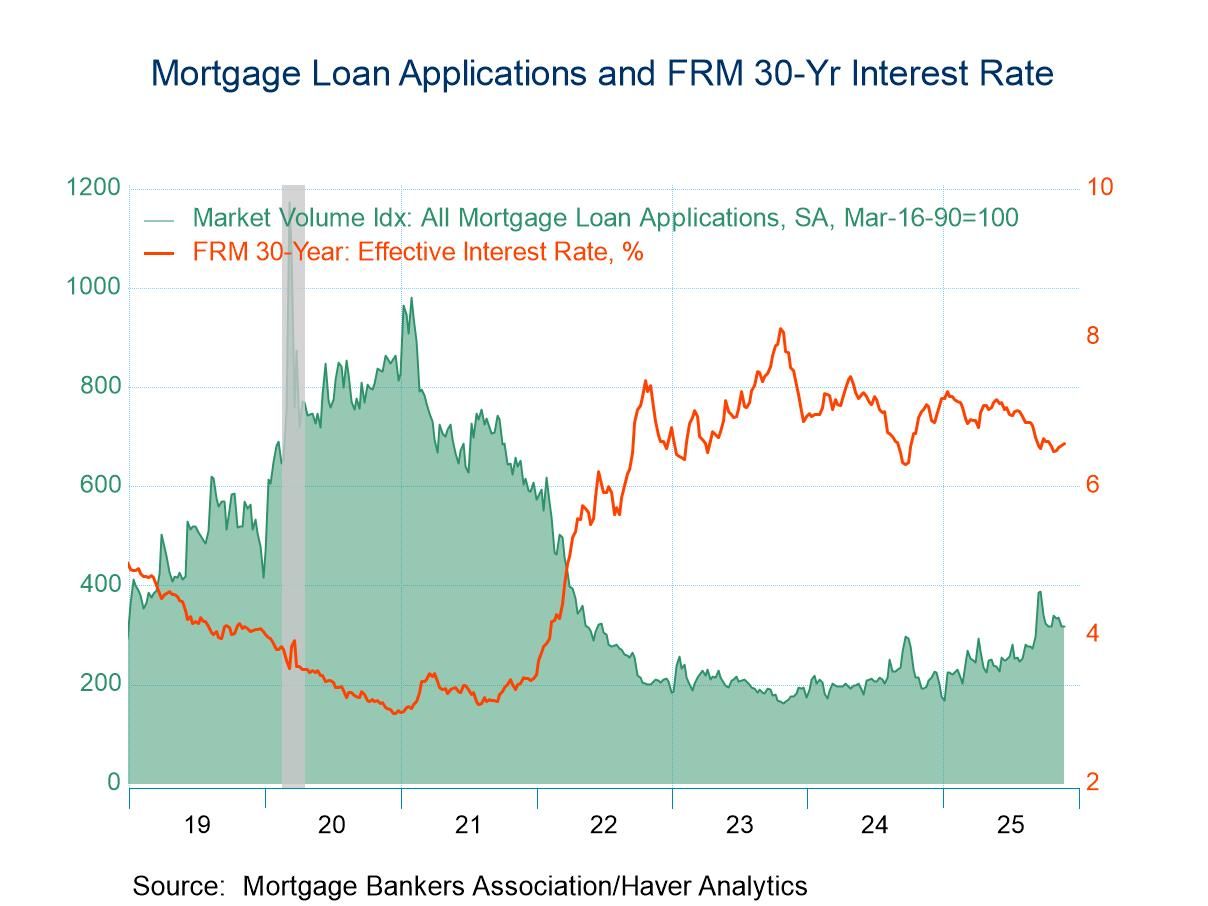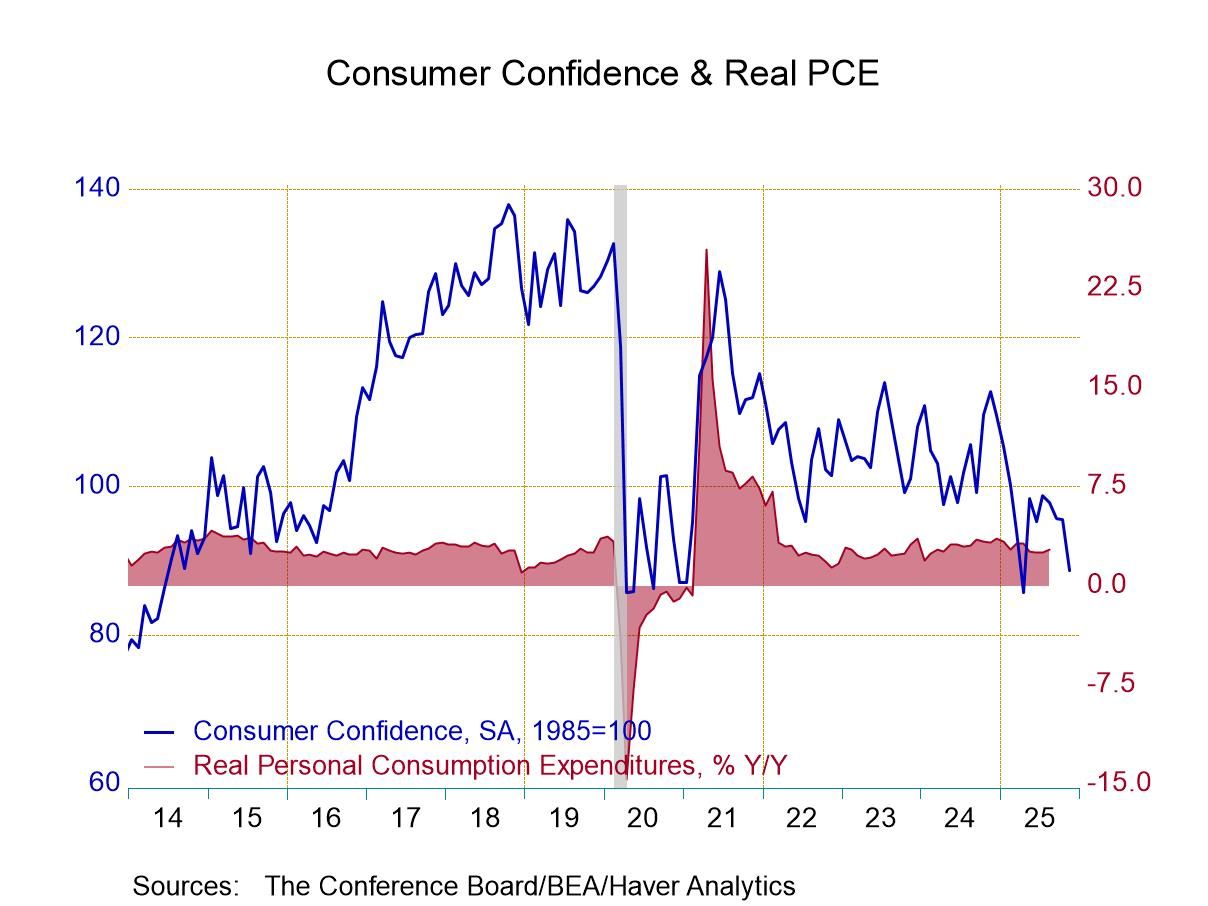 Global| May 25 2004
Global| May 25 2004Chain Store Sales Lower Again As Gasoline Prices Rose Further
by:Tom Moeller
|in:Economy in Brief
Summary
Chain store sales fell 0.5% last week on top of a 0.8% decline the week prior, according to the International Council of Shopping Centers (ICSC)-UBS. Retail gasoline prices rose to an average $2.06 per gallon last week (+38.8% y/y), [...]
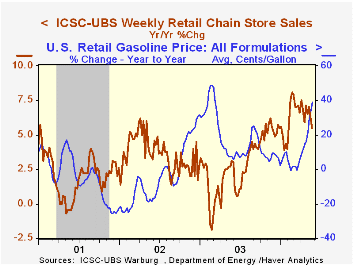
Chain store sales fell 0.5% last week on top of a 0.8% decline the week prior, according to the International Council of Shopping Centers (ICSC)-UBS.
Retail gasoline prices rose to an average $2.06 per gallon last week (+38.8% y/y), up 14.8% from the April average of $1.80.
So far in May, chain store sales are 1.0% above the April average due to a 1.5% jump at the end of last month.
During the last ten years there has been a 59% correlation between y/y change in chain store sales and the change in non-auto retail sales less gasoline.
The ICSC-UBS retail chain-store sales index is constructed using the same-store sales reported by 78 stores of seven retailers: Dayton Hudson, Federated, Kmart, May, J.C. Penney, Sears and Wal-Mart.
| ICSC-UBS (SA, 1977=100) | 05/22/04 | 05/15/04 | Y/Y | 2003 | 2002 | 2001 |
|---|---|---|---|---|---|---|
| Total Weekly Retail Chain Store Sales | 439.8 | 442.2 | 5.5% | 2.9% | 3.6% | 2.1% |
by Tom Moeller May 25, 2004
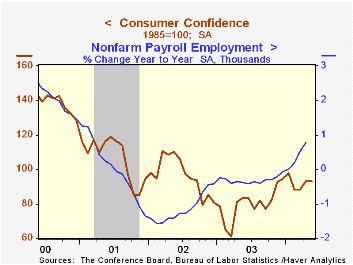
The Conference Board’s Index of Consumer Confidence for May was about unchanged at 93.2 versus the upwardly revised April reading of 93.0. Confidence in April had improved 5.1% versus March. Consensus expectations were for a slight rise in May to 94.0.
The present situation reading was little changed at 90.3 (+34.2% y/y) and the index of consumer expectations ticked 0.4% higher (+0.7% y/y).
While perceptions of current business conditions improved to the highest level since June 2001, jobs were viewed as hard to get by 30.6% of respondents. The increase in this measure erased all of the improvement (decline) logged earlier this year.
Expectations for business conditions in six months jumped in May to the highest level since January as 19.2% of respondents expected there to be more jobs in six months, the highest percentage since January.
The May Confidence reading was right in line with the unchanged level of Consumer Sentiment in mid-May reported earlier by the University of Michigan.
During the last ten years there has been a 67% correlation between the level of consumer confidence and the y/y % change in real PCE.
The Conference Board’s survey isconducted by a mailed questionnaire to 5,000 households and about 3,500 typically respond.
| Conference Board | May | April | Y/Y | 2003 | 2002 | 2001 |
|---|---|---|---|---|---|---|
| Consumer Confidence | 93.2 | 93.0 | 11.5% | 79.8 | 96.6 | 106.6 |
by Tom Moeller May 25, 2004
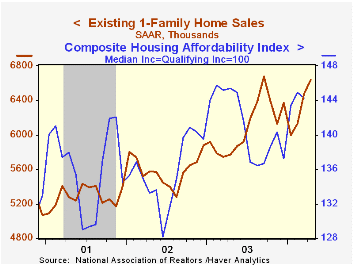
Sales of existing single family homes reported by the National Association of Realtors added another 2.5% in April to the gains of the prior two months. Sales of 6.640M were near the record of 6.68M set in September of last year. Consensus expectations had been for April sales 6.40M. March was unrevised.
Housing affordability has continued to rise despite higher mortgage rates as home price inflation has been stable near 7% and growth in real disposable income has accelerated to 4.0% from 2.6% last year.
Sales rose in all regions of the nation. In the Midwest sales rose 4.4% (+11.0% y/y) and in the South they rose 3.5% (+16.6% y/y). Lesser gains were logged in the Northeast where sales rose 1.4% (12.3% y/y) and in the West where sales rose 0.5% (17.9% y/y).
The median price of an existing home rose 1.1% m/m to $176,000 (+7.3% y/y). The prior month's figure was revised down.
The figures reflect closings of home sales in earlier months.
The latest release from the National Association of Realtors is available here.
| Existing Home Sales (000, AR) | April | Mar | Y/Y | 2003 | 2002 | 2001 |
|---|---|---|---|---|---|---|
| Existing Single-Family | 6,640 | 6,480 | 15.1% | 6,098 | 5,593 | 5,290 |
Tom Moeller
AuthorMore in Author Profile »Prior to joining Haver Analytics in 2000, Mr. Moeller worked as the Economist at Chancellor Capital Management from 1985 to 1999. There, he developed comprehensive economic forecasts and interpreted economic data for equity and fixed income portfolio managers. Also at Chancellor, Mr. Moeller worked as an equity analyst and was responsible for researching and rating companies in the economically sensitive automobile and housing industries for investment in Chancellor’s equity portfolio. Prior to joining Chancellor, Mr. Moeller was an Economist at Citibank from 1979 to 1984. He also analyzed pricing behavior in the metals industry for the Council on Wage and Price Stability in Washington, D.C. In 1999, Mr. Moeller received the award for most accurate forecast from the Forecasters' Club of New York. From 1990 to 1992 he was President of the New York Association for Business Economists. Mr. Moeller earned an M.B.A. in Finance from Fordham University, where he graduated in 1987. He holds a Bachelor of Arts in Economics from George Washington University.



